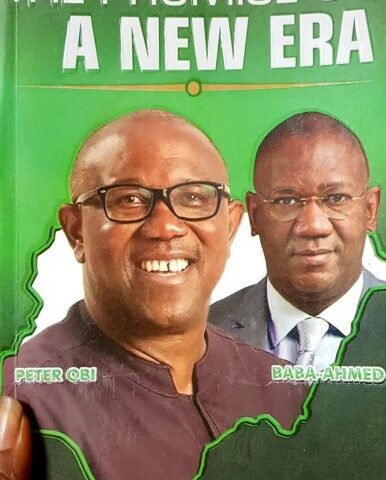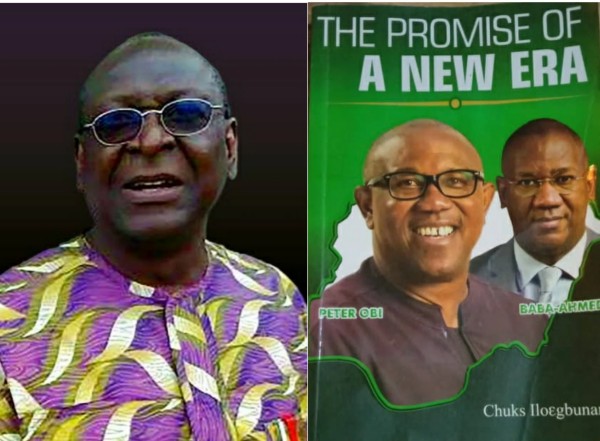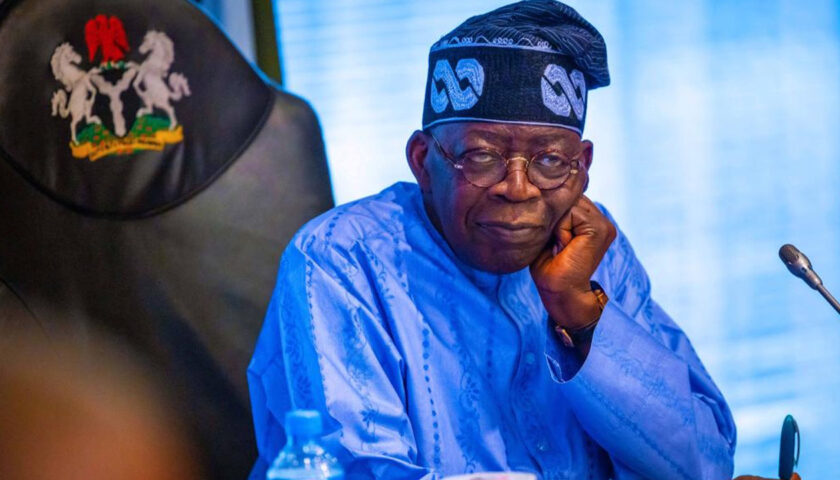BOOK REVIEW: Promise of a New Era is written from a point of knowledge and understanding of the person of Mr. Obi – the politician, the man, and the trader -, as Obi prefers to call himself, despite having a degree in Philosophy from the University of Nigeria, Nsukka – Reviewed by Angela Agoawike.
The use of biographies for election campaigns dates back decades. Sometimes written in a hurry, a campaign biography gives highlights of the candidate’s life, introduces him to the voting public and so doing, gives an insight into his aspiration to the highest office in the land.
The importance of a presidential campaign ‘biography’ is underlined by among others, the setting up of libraries to look for such books and store them for posterity, just like the Clarke Library of the Central Michigan University in the USA has done since the early 1960s.
Many politicians, such as former American President Jimmy Carter released campaign biographies. As a little-known governor of the American State of Georgia, “Why Not The Best?” was published in 1976, during his quest for the American presidency. It was his introduction to Americans beyond Georgia.
Fast-forward to now, and in Nigeria, Peter Gregory Onwubuasi Obi, candidate of the Labour Party, seems to be the man of the moment, in the coming presidential election, and the book – The Promise of a New Era by Chuks Iloegbunam, a foremost Nigerian journalist, tells his story.
Before now, Presidential election campaigns in Nigeria have been characterised by display of photos and videos of candidates and their surrogates, stalking the economic and social spaces of less privileged Nigerians (especially the women), pretending to identify with them for fleeting moments as they harvest photo opportunities for their campaigns. The candidates, surrounded by their supporters, are seen taking over from Mama Grace frying her delicious Akara (bean cake) by the roadside or cajoling ‘Mama Joy’ as they take control of her stool by the fireside on the road, where she roasts corn to make some cash for her family’s meal for the day.
They also visit one or two of the numerous camps for people maimed and displaced by the killings, and general insecurity that have turned many Nigerians into refugees in their own country.
They (politicians) do these in their bid to curry goodwill, and ‘garner’ enough votes, to propel them into the various public offices they are seeking. Secure in their new offices, and in the self-praise of how they had worked hard to get there, ‘Mama Grace’, ‘Mama Ibeji’ and others like them continue their daily drudgery of a lifestyle as these men/women and their families feed fat on their collective commonwealth, pending when they come back for another round of photo ops.
Nigeria’s Presidential candidates hardly campaign on substance, or their philosophies on governance and how their ideological persuasions will underpin their activities while in office.
For this election cycle, it is fair to say that it is no longer business as usual as the eating of corn, frying of akara and jumping onto tricycles are no longer trending. In the run-up to the Presidential election on February 25, Nigerians, especially the young ones have taken the bold and courageous step of asking questions, interrogating campaign promises, and holding the candidates accountable for their past years in public offices.
How this turn-around has come about, is essentially what Iloegbunam, set out to capture in The Promise of a New Era. It is a book about Mr. Peter Obi, a former governor of Anambra, State who has captured the attention of progressive-minded and good governance-focused Nigerians. Most importantly, Mr. Obi has captured the attention of the country’s youth, who have decided to take active part in changing the status quo and as they say, with Mr. Obi and Dr. Yusuf Datti Baba-Ahmed, former Senator, and proprietor of one of Nigeria’s foremost private universities – Baze University, representing their collective interests.
For the duo, to have, through their candidacy demolished the existing political system and enthroned a campaign based on substance in less than 8 months of campaigning for the highest office in the land. This points to a fatigue in the people’s tolerance of corruption, nepotism, ethnic and religious bigotry that have been used to exploit Nigerians by the political class. The people have longed for something new and different.
The Promise of a New Era, dedicated to the “cause of fair, free, credible and transparent elections in Nigeria,” is part history, part biography of Mr. Obi, and Dr. Baba-Ahmed. Above all, however, it is a campaign handbook for the Peter Obi/Datti Baba-Ahmed campaign for the presidential election.
Over its eight chapters that run across 192 pages made up of introduction; Obi’s Quotable Quotes, Intellectual Interventions which is a collection of opinion articles published in Nigerian newspapers by notable columnists as Festus Adedayo (Peter Obi as Nigeria’s Rosa Parks); Okey Ndibe (Is It Peter Obi’s election?); Ferooq Kperogi (the Peter Obi Tsunami APC and PDP are underrating; and Obi Nwakanma (Peter Obi: The return if Zikism); and a 6 page index, Iloegbunam introduces his readers to the many registered political parties, the intrigues of how they chose their Presidential candidates and the emergence of the man of the moment in Nigeria’s politics – Peter Obi – as the flag bearer of a hitherto little known Labour Party (LP), following his resignation from the People’s Democratic Party, PDP and withdrawal from its presidential primary.

Picture of Peter Obi (left) and his running mate Dr Yusuf Datti Baba-Ahmed on the cover of the book
Iloegbunam’s Promise of a New Era is written from a point of knowledge and understanding of the person of Mr. Obi – the politician, the man, and the trader -, as Obi prefers to call himself, despite having a degree in Philosophy from the University of Nigeria, Nsukka. Indeed, having come from a family of traders, Iloegbunam makes his readers to understand that trading runs through Mr. Obi’s DNA, (page 74). He is naturally gifted in buying and selling, and it is through it that he built his fortune.
When Mr. Obi burst onto the national scene following the March 15, 2006, Supreme Court declaration that he was the duly elected governor of Anambra State, three years after the election, many thought of him as being effeminate, due to his soft voice. But to those who know him or have followed his political career from that day, Mr. Peter Obi’s outward demeanour belies his steely resolve, which he deploys in getting results from whatever he sets his sight on.
He also embraces that resolve with conviction. This can be seen in the two court cases he instituted and won – the supreme court case that restored his initial mandate, and the Appeal Court victory (9 February 2007) that returned him to office following his impeachment by a hostile legislature (Obi was an APGA governor while all members of the State House of Assembly were PDP members). He remains till date, the only Nigerian impeached governor that has had his mandate restored (Chapter 3, pages 63-70).
When it comes to matters of corruption which is synonymous with Nigerian politicians, Mr. Obi, the author infers, seems to be shoulders above his opponents, some of whom are dogged by one corruption allegation or the other. This is despite all the high level and privileged positions he has occupied in the corporate world as Chairman of numerous banks and director of companies, (see Mr. Obi’s detailed CV on pgs. 122 -126).
If indeed, birds of the same feather do flock together, it does not come as a surprise therefore, that Mr. Obi and Dr Baba-Ahmed are on a joint ticket for the Presidency. Like Obi, who as governor, we learn from the book, never allocated any land or property to himself, and out of office, remains the only former governor in Nigeria’s history that draws no pension, Dr. Baba-Ahmed equally does not live off government. He is a highly successful businessman, an academic and educationist who established one of the best private universities in Nigeria (Baze University, Abuja– see CV on page 132), in addition to having served in the Senate.
In the course of this electioneering campaign, many people have dismissed Mr. Peter Obi, as a trader vying for the presidency through a party with no structures to guarantee him even a third-place finish on February 25. They have described his army of youthful followers known as OBIdients as a collection of “four persons tweeting from a room,” in reaction to the massive online following of Mr. Obi.
What is certain, as the book seems to portray, is that contrary to the above, the OBIdients seem to be everywhere (online and offline), with their movement borne out of the desire to ‘take back Nigeria’ from the stranglehold that seems to be suffocating it. This, the book infers, is not lost on Obi, who has accepted and even projects this unusual Nigerian political alliance by declaring that “Datti and I are not contesting the president and vice…you are contesting through us”. Iloegbunam captures this unusual relationship between Obi and the ‘Obedients’ in one of the quoted tweets in the book: “My phone, my data, you no give me shishi, I don’t work for you; I work for Nigeria. If Atiku drag my candidate (which happens to be you) I will drag his babariga…” (page 48)
No wonder that Obi in one of the quotes under Obi’s quotable quotes that “I am not desperate to be president; I’m desperate to see Nigeria work, especially for the youth…” Iloegbunam has brought Nigerians the story of Peter, hoping to use it to drum support for the Obi-Datti presidential ticket. Are Nigerians listening to him? Are the youths ready? These questions will be answered on February 25, 2023, when Nigerians take to the polls to choose a President for themselves.
…Angela Agoawike, Fellow, Nigerian Guild of Editors (FNGE) is a former Head of the Public Relations and Information Department, (PRID) at OPEC, Vienna. She can be reached via aagoawike@gmail.com





